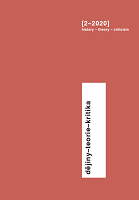TÁBORY PRO DAREBÁKY, POVALEČE A CIKÁNY“ PRˇ ÍSPEˇVEK K VÝZKUMU POLITIKY A PRAXE KRIMINALIZACE „PRÁCE SE ŠTÍTÍCÍHO“ OBYVATELSTVA ZA DRUHÉ REPUBLIKY A PROTEKTORÁTU (1938–1942)
‘Camps for Scoundrels, Layabouts, and Gypsies.’ Contribution to Research into the Policy and Practice of Criminalisation of ‘Work-Shy’ Population During the Second Czechoslovak Republic and the Protectorate (1938–1942)
Author(s): Pavel Baloun, Jaromír MrňkaSubject(s): Ethnohistory, Political history, Social history, Interwar Period (1920 - 1939), WW II and following years (1940 - 1949), Fascism, Nazism and WW II
Published by: Univerzita Karlova v Praze - Fakulta humanitních studií
Keywords: punitive work camps; criminology; police prevention; anti-Gypsy measures; racism; genocide of Roma and Sinti;
Summary/Abstract: This study sets the origins and development of punitive work camps from the period of the Second Czechoslovak Republic (30 September 1938 – 15 March 1939) and the Protectorate of Bohemia and Moravia (1939–1945) into the context of preventive police measures which took shape in contemporary criminalistics since the beginning of the twentieth century. These measures are intentionally related to criminalisation of ‘Gypsies’ who formed part of a wider image of ‘work-shy’ population. During the Second Republic, the anti-Gypsy discourse was of key significance in the formulation of legislative measures aimed at persecution of ‘work-shy’ people and in the various demands to create and operate internment camps. Analysis of various sources of police and administrative provenance shows that until late 1941 or early 1942, the occupation authorities hardly intervened in the formulation of anti-Gypsy measures. Their formulation and implementation remained in the hands of Protectorate government and police authorities. Under the surface of contemporary administrative terminology and jargon of police reports, the authors of this study identify conflicts and tensions, which stemmed from the different notions and interests of various social groups that demanded persecution of people described as ‘Gypsies’ or ‘work-shy’.
Journal: Dějiny - Teorie - Kritika
- Issue Year: 2020
- Issue No: 02
- Page Range: 191-221
- Page Count: 31
- Language: Czech

